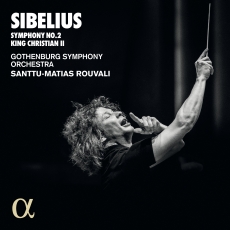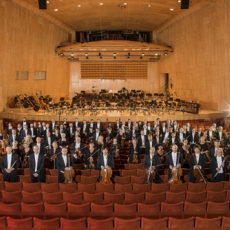Santtu-Matias Rouvali & GSO - Sibelius: Symphony No. 2, King Christian II - Europadisc
Following up on their recent, widely-acclaimed recording of Sibelius’s First Symphony, the Gothenburg Symphony Orchestra under chief conductor Santtu-Matias Rouvali continue their projected Sibelius cycle with an equally impressive account of the Second Symphony. This is one of the composer’s most popular works and, against strong competition, the question inevitably is whether they can offer anything new. If you’re expecting any startling revelations or novel interpretative quirks, the answer may well be no; what is startling about this performance, however, is its combination of sheer mastery with a dazzling textural clarity. The Gothenburg orchestra has this music in their DNA, and it’s one of Rouvali’s many strengths that he knows how to bring out the best from his players and the music while knowing when to not get in the way. At the same time, he achieves fabulous transparency through natural means, without any unnecessary spotlighting or knob-twiddling.
This is a performance of enormous integrity and structural coherence, most obviously in the unfolding of the first movement, with its multitude of ideas all derived from the opening string gesture, transformed by inversion, retrograde, scoring, register and context. Rouvali’s pacing is impeccable, and he also knows how to shape the music’s ebb and flow, building to powerful climaxes featuring glowing brass and an enviable depth of tone from the strings. Outstanding, too, are the woodwind, whether in solos or in the ‘voicing’ of the section as a whole.
The first movement’s close – delivered here as an almost throw-away gesture – serves as an excellent foil to the mysterious opening of the second movement, with its ghostly pizzicato strings and sombre bassoons. For many commentators this is the work’s least successful movement, at least in purely ‘symphonic’ terms. Yet Rouvali invests this Life-and-Death struggle with the same logical inevitability that he brings to the first movement, while getting the most out of the brass outbursts (those tenacious, snarling chords expertly shaped and held), and achieving a hushed inwardness in the gentle ‘Christus’ motive on the strings (at 4’34”). You can also hear the responsiveness of the players not just to Rouvali himself but to one another – the true mark of a great ensemble.
In the Vivaccisimo third movement Rouvali brings a breezy but light-footed momentum to the music, underpinned, as ever, by a sureness in the orchestral bass, while in the Lento ‘trio’ section Mårten Larsson’s affecting oboe solos are gorgeously shaped and pliant. During the transition to the finale, the swirl of cross-beat quavers in the strings, with a slight accent to each pair, is typical of Rouvali’s unself-conscious attention to detail. And the finale itself? Few other orchestras could manage the depth and richness of tone, or unerring feel for the idiom, that the Gothenburgers do without a sense of overdoing things: here, however, there’s a combination of power and restraint, so that the stormy build-up of the movement’s second half and the final, refulgent climax really do crown a reading of noble inevitability and unshowy intensity.
The coupling has a very different feel: the Suite from Sibelius’s 1898 music to his friend Adolf Paul’s historical drama, King Christian II. There’s more space around the sound here, yet also a feeling of greater intimacy, with grace and poise to the opening Nocturne (the woodwind enjoying their moment in the spotlight), and exquisite string shading in the following Elegie. The centralMusette has great buoyancy, with some delicious clarinet and bassoon playing bringing a folk-like hue and mood to proceedings. Coloured by horns, brass and timpani, there’s a feeling of the theatrical outdoors to the fourth-movement Serenade, while the concluding Ballade has real bite, with scurrying strings and plaintive wind, and an infectiously demonic central section, culminating in a joyous major-key episode before the fierce minor-key close. Listening to the uninhibited playing of the Gothenburg players, you can hear why this was one of his first major international successes at the turn of the century.
With this generous coupling, Rouvali’s account of the Second Symphony is a major addition to the catalogue, and only serves to confirm this as one of the most satisfying and exciting Sibelius cycles to emerge in recent years, all captured in excellent sound by producer Jens Braun and engineer Lars Nilsson. Listeners can look forward to future instalments with confidence!


